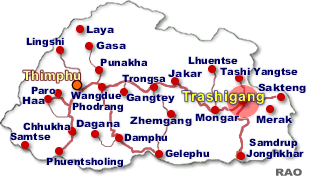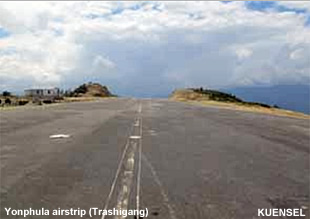 |
Bhutan Drukair |
|
 |
Bhutan Information |
|
|
|
| 5 September 2011 |
 Trashigang: Domestic airstrip at Yonphula is now open for operations Trashigang: Domestic airstrip at Yonphula is now open for operations |
 |
Yonphula passes test flight
| With a test flight successfully landing and taking off from Yonphula, Trashigang, yesterday, Bhutan's first domestic airstrip is now open for scheduled flight operations, says the department of civil aviation (DCA). |
| Source: KUENSEL, Bhutan's National Newspaper 2011 |
 |
top
| 28 May 2011 |
 Trashigang: Domestic airstrip at Yonphula ready for take-off Trashigang: Domestic airstrip at Yonphula ready for take-off
|
 |
 |
|
The first of three domestic airstrips, Yonphula in Trashigang, is ready for flight operations, according to the department of civil aviation (DCA).
Despite its completion, domestic air services are not slated to commence until July. DCA director general said that domestic operations will begin once the Batpalathang airstrip in Bumthang is completed. He said that DCA is "hopeful" of the airstrip being completed by July 2011.
|
|
Construction of the Gelephu airstrip has not even begun. The communications ministry was negotiating with the lowest bidding company as of yesterday. The ministry has floated the tender thrice, but companies have proposed costs higher than the available budget.
Meanwhile, national airline Drukair is expecting its leased twin turbo propellor ATR aircraft on Monday. The airline is hoping to tackle two birds with one stone by operating the 48-seater aircraft both for the domestic and international sectors.
"Initially domestic market may be small," Drukair CEO, Tandin Jamso said. By using the ATR aircraft on its short international routes, like Kathmandu and Kolkata, he said that Drukair would maximise utilisation and also increase capacity, which is in line with the government's aim to bring in 100,000 tourists. The aircraft will fly daily to Kathmandu and Kolkata.
But the airline will have to conduct test flights and satisfy DCA before it can use its ATR to fly domestically. Phala Dorji said that it is "premature" to comment on whether Drukair can use its ATR to operate domestically. He said that Drukair will have to show that the aircraft can handle the short runways of the two airports in Trashigang and Batpalathang.
Meanwhile, Bhutan's international aviation network was significantly expanded last week. Bangladesh, under a new air agreement, has permitted Bhutanese airlines to fly to Singapore, Nepal, all Indian airports with the exception of Kolkata, and Sharjah in the Middle East, from an airport based in Bangladesh. Drukair is studying the financial viability of operating these sectors.
Bangladesh has also allowed the use of its domestic airports for use by Bhutanese airlines for passenger, cargo, and diversion in the event of bad weather and technical reasons.
| By
Gyalsten K Dorji, KUENSEL, Bhutan's National Newspaper 2011 |
 |
top
| 19 March 2011 |
 Buddha Air to suspend service Buddha Air to suspend service |
 |
Buddha Air suspended scheduled services owing to low passenger demand
In what could be an ominous sign for upcoming Tashi Air, the first airline to compete with Drukair, and the first foreign airline to operate in Bhutan, flew its last scheduled flight into Paro airport, yesterday.
Nepalese owned private airline Buddha Air has suspended scheduled services, owing to low passenger demand which caused the company losses in excess of USD 100,000, according to its local representative, Kinley Tshering.The airline's scheduled commercial operations to Bhutan began in August last year.
But the airline's local representative emphasised that Buddha Air is not pulling out of Bhutan, and will continue to operate chartered flights into Paro.
He said that, if charters increase significantly in the future, then scheduled services may resume. The airline has at least seven confirmed chartered flights between March-April, he said.
Kinley Tshering claimed that, while the airline "did very well" during the fall tourist season of 2010, the recent Tara Air crash in Nepal, which killed 22 passengers, of which 18 were Bhutanese, caused any local demand to completely cease. "We had people who have tickets and haven't come to the office for a refund, it was basically a no-show," he said. In airline terminology, a ‘no-show' is when the reservation is neither used nor cancelled.
While Buddha Air has not experienced any serious incidents since it began operations in 1997, local travellers still prefer flying Drukair's larger jet aircrafts prior to the Nepal air crash. Even if it meant paying USD 20 more. "We didn't want a price war," Kinley Tshering said, explaining why Buddha Air had not offered lower and more attractive prices. But he also pointed out that, even though a Buddha Air ticket was already about 9 percent lower than a Drukair ticket, the national airline's promotional packages to Nepal had largely succeeded in keeping customers from switching over.
He also pointed out that, while Buddha Air had not gained any financial profit, one positive result of Buddha Air's entry into the Bhutanese aviation sector, was that the national airline was forced to lower air fares in the Paro-Kathmandu sector. "It has shaken them up a little bit," he said.
"None," said Kinley Tshering in response to whether Buddha Air's failure to secure the domestic air services contract in December last year was a factor in its cessation of scheduled services.
When Buddha Air commenced scheduled services to Paro airport in August last year, the airline expected attracting both tourists and local travellers. It not only planned to gradually increase its schedule to daily flights, but also to link Paro airport with cities in India and Bangladesh.
| By
Gyalsten K Dorji, KUENSEL, Bhutan's National Newspaper 2011 |
 |
top
| information on Bhutan |
 |
|





